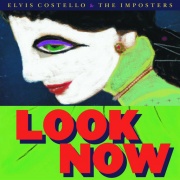Louder Than War, October 13, 2018: Difference between revisions
(Create page for Louder Than War review of ''Look Now'') |
(formatting) |
||
| (One intermediate revision by the same user not shown) | |||
| Line 4: | Line 4: | ||
{{:UK online publications index}} | {{:UK online publications index}} | ||
{{Bibliography article header}} | {{Bibliography article header}} | ||
<center><h3> | <center><h3> Look Now </h3></center> | ||
<center>''' Elvis Costello and the Imposters </center> | |||
---- | ---- | ||
<center> Sam Lambeth</center> | <center> Sam Lambeth </center> | ||
---- | ---- | ||
''' | '''From the ''Imperial Bedroom'' to the wider world, Elvis Costello and his Imposters return after a lengthy recording hiatus with his most sonically satisfying album in decades. Sam Lambeth reviews. <br> | ||
{{5stars}}{{3of5stars}} | {{5stars}}{{3of5stars}} | ||
{{Bibliography text}} | {{Bibliography text}} | ||
Elvis Costello is impossible to pigeonhole. Over his almost fifty-year career, the Liverpudlian-cum-Londoner has played the part of arsenic-laced punk curmudgeon and tear-stained country troubadour. His most successful records, though, are simply the ones where he has something important to say — whether he be raging against the dying of the light in fuzz-drenched despondency (see ''My Aim is True'', ''Brutal Youth'', ''When I Was Cruel'') or lamenting the minutiae of suburban love in perfectly-formed pop (''Get Happy!!'', ''Blood & Chocolate''). Sitting somewhere in between, of course, is the baroque brilliance of ''Imperial Bedroom'', his 1982 magnum opus that married Costello's musical curiosity to the chamber pop production of the late, great Geoff Emerick. | |||
Elvis Costello is impossible to pigeonhole. Over his almost fifty-year career, the Liverpudlian-cum-Londoner has played the part of arsenic-laced punk curmudgeon and tear-stained country troubadour. His most successful records, though, are simply the ones where he has something important to say | |||
After touring that record recently with his trusty steeds The Imposters, Costello felt the time was right to stretch his musos and return to the studio. The resulting record, ''Look Now'', is like ''Imperial Bedroom'', in which Costello is a spy in the house of love, searching smoking embers in burnt-out bedroom parlours and neglected crevices for tales of familial fatigue and wandering eyes. | After touring that record recently with his trusty steeds The Imposters, Costello felt the time was right to stretch his musos and return to the studio. The resulting record, ''Look Now'', is like ''Imperial Bedroom'', in which Costello is a spy in the house of love, searching smoking embers in burnt-out bedroom parlours and neglected crevices for tales of familial fatigue and wandering eyes. | ||
Take, for example, the scorched hymn Stripping Paper, where | Take, for example, the scorched hymn "Stripping Paper," where Costello's delicate burr and gift for characterisation focuses on a forlorn partner doing a spot of both household and personal decoration. Embellishing his lyrics with a mess that's more than just emulsion, Costello sighs ''"I can't close the door, he complimented my taste, I anointed his serious face with wallpaper paste. I wish we could laugh like that now,"'' the kind of deceptively throwaway line that demonstrates Costello's gift for natural, but devastating, storytelling. | ||
Equally arresting is the sparse, Burt Bacharach-assisted torch song Photographs Can Lie. Matching the raw emotion and delicate melodies of their previous collaborative effort, | Equally arresting is the sparse, Burt Bacharach-assisted torch song "Photographs Can Lie." Matching the raw emotion and delicate melodies of their previous collaborative effort, 1998's ''Painted From Memory'', Costello's characters are shown to be flawed, forgetful and philandering in equal measure. ''"I'll never be his little girl again,"'' weeps the song's main character, a daughter that has discovered her father is nothing more than a prized cad. | ||
Costello's gift for shining lights on the vindictive and the vindicated are still in heavy display. One of the album's standout tracks, "I Let the Sun Go Down," is buoyed by forlorn trumpets, twinkling pianos and Pete Thomas' gently shifting drums, as Costello plays the role of a proud Brit looking down upon the rubble and the ritz of Brexit. | |||
As a whole, ''Look Now'' | As a whole, ''Look Now'' doesn't fall into the trap of trying to stay contemporary (see, rightly or wrongly, Costello's main peer at this point, Paul McCartney). Rather, it's something of a relic. The mood is relaxed throughout, melodies and choruses rising high on the gorgeously cinematic "Suspect My Tears" and the woozy '50s game show glamour of "Under Lime." There's room for rapidness, too, as on the "Ashes to Ashes"-cum-disco groove of "Burnt Sugar Is So Bitter" and the dark strut of standout "Unwanted Number." | ||
''Look Now'' is an urge, a plea and an instruction to each flawed and emotional character that runs through each song. | ''Look Now'' is an urge, a plea and an instruction to each flawed and emotional character that runs through each song. There's a mess and a problem that can't be avoided. Just like on ''Imperial Bedroom'', and many of his other countless classics, Costello paints a vivid picture that lingers and haunts like a true multi-layered masterpiece. ''"Why won't heaven help me?"'' Costello pleads at one point. Reports of struggles with mortality aside, Costello need not look for divine intervention when he's in such fine form. | ||
{{cx}} | {{cx}} | ||
| Line 39: | Line 36: | ||
'''Louder Than War, October 13, 2018 | '''Louder Than War, October 13, 2018 | ||
---- | ---- | ||
[[Sam Lambeth]] reviews ''Look Now''. | [[Sam Lambeth]] reviews ''[[Look Now]]''. | ||
{{Bibliography images}} | {{Bibliography images}} | ||
[[image:Look Now album cover.jpg|180px|border|link = Look Now]] | |||
{{Bibliography notes footer}} | {{Bibliography notes footer}} | ||
Latest revision as of 01:56, 6 May 2020
|
